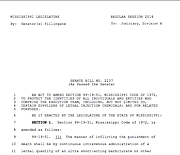Rep. Robert Foster, R-Hernando, presented the amendment that he and four other Republicans authored to allow death by firing squad if lethal injection drugs become too costly or unavailable. Imani Khayyam/File Photo
JACKSON — Death by firing squad could become an option for administering the death penalty if Senate Bill 2237, which passed the Mississippi House of Representatives passed Friday and held on a motion to reconsider, becomes law.
The bill's primary intent is to protect the identities of the state's execution team and lethal-injection chemical suppliers in the state of Mississippi. The bill would exempt the identities of not only the state executioner and his team but also local lethal injection drug suppliers and any witnesses to an execution from the Public Records Act.
Rep. Joey Hood, R-Ackerman, presented the bill to the House last Friday, saying it had the bi-partisan support of Attorney General Jim Hood, the only statewide elected Democrat, and Gov. Phil Bryant, a Republican. Joey Hood told the House that the primary intent of the legislation was to protect the identities of the execution team and the drug supplier. House Democrats challenged the bill in a half hour debate, questioning the motives for the bill's lack of transparency.
Rep. Chris Bell, D-Jackson, asked Rep. Joey Hood whether the bill contradicted the state's attempts at being transparent.
"The voters and the people of this state have overwhelmingly approved of the implementation for the death penalty," Rep. Joey Hood said in response.
The attorney general has said of the 31 states that have the death penalty, 20 of those states have confidentiality laws in place. Rep. Joey Hood said the legislation was "nothing new" compared to other states.
Rep. Jay Hughes, D-Oxford, said he was concerned about what the bill would force the media to do to access what was previously public record. "We are restricting the media," he told Rep. Hood. "We are telling them what they can do as a state."
Rep. Hood maintained that a press representative was present hearings for the bill and said that anyone can access the information under civil procedure in the court of law and ask for a subpoena for those documents to be turned over.
Rep. Adrienne Wooten, D-Jackson, questioned Rep. Hood on why the drug suppliers, and not the manufacturers, needed to be exempt from the Public Records Act.
"I think the supplier supplies the drugs, I think the manufacturer makes the drugs and ships it to the supplier and the supplier provides it to the prison, that would be my assumption," Rep. Hood told Wooten.
Wooten pressed further, asking who created and mixed the concoction drug (a mix of several drugs) used for lethal injections.
"Whose responsibility is it to put the drug together?" she asked Rep. Hood.
"I don't have the exact answer for that," Rep. Hood said. "All I know is that the manufacturers manufacture the drug, and the supplier supplies the drug."
Wooten also asked Rep. Hood if he was aware of the lawsuits in Missouri that news organizations recently won against the state's Department of Corrections for similar media exclusion attempts. Hood said he did not know about the lawsuits.
In 2014, The Guardian, the Associated Press and three Missouri newspapers sued the Missouri Department of Corrections to release the names of pharmacies where the state bought lethal execution drugs. The news organizations won in court last week, a Guardian article says, and the judge ruled that the pharmacies did not count as a part of the execution team. Therefore, the names of the pharmacies had to be a part of the public record.
The final order said that the Missouri Department of Corrections "knowingly violated the Sunshine Law by failing to comply with statutory time limits, withholding whole categories of requested documents without justification, refusing to provide redacted records, and citing irrelevant exceptions to the Sunshine Law to justify withholding responsive documents."
Wooten told Rep. Hood that Mississippi was asking for the same sort of situation by passing Senate Bill 2237. "Based off of the bill you're bringing here, the news media was able to take this to court, which would be taking the state to court at this point—taking this to court and having this overturned," Wooten said.
Before the House could vote on the bill, Rep. Robert Foster, R-Hernando, and four other Republicans offered an amendment to allow the Department of Corrections to use a firing squad to carry out the death penalty if "lethal injection chemicals becomes (sic) unavailable or is deemed too costly by the Commissioner of the Department of Corrections and the Attorney General."
The amendment passed 70-39. Eleven representatives did not vote on the amendment. The bill also passed, but was held on a motion to reconsider.
Email state reporter Arielle Dreher at [email protected]. For more legislative coverage visit jfp.ms/state.
Clarification: This article has been updated with first names to distinguish between Attorney General Jim Hood and Rep. Joey Hood.




Comments
Use the comment form below to begin a discussion about this content.
comments powered by Disqus